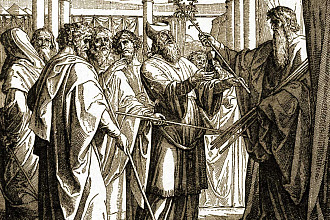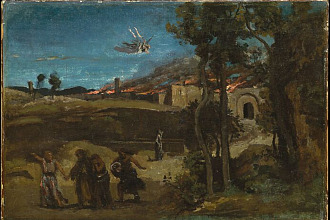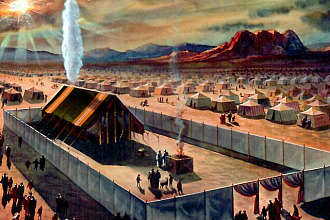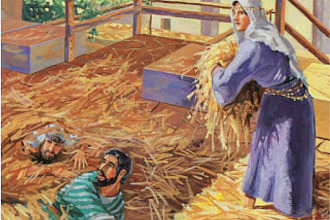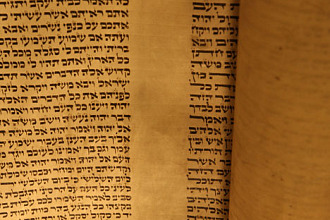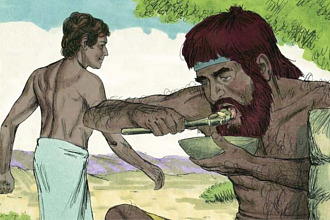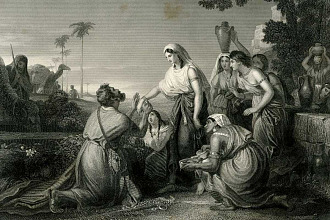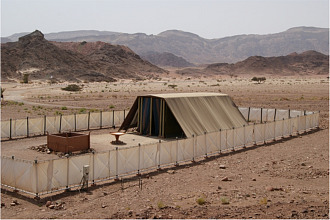Parasha for the Week: Lech Lecha Genesis 12:1 - 17:27
Aftarah for the Week: Isaiah 40:27 - 41:16
Besorat Yeshua: Mark 10:28 - 40
Overview
Ten generations have passed since Noach. Man has descended spiritually.
In the year 1948 from Creation, Avram is born. By observing the world, Avram comes to recognize G-d's existence, and thus merits that G-d appear to him.
At the beginning of this weeks Torah portion G-d tells Avram to leave his land, his relatives and his father's house and travel to an unknown land where G-d will make him into a great nation.
Avram leaves, taking with him his wife Sarai, his nephew Lot, their servants, and those whom they converted to faith in G-d.
When they reach the land of Canaan, G-d appears to Avram and tells him that this is the land that He will give to his descendants.
A famine ensues and Avram is forced to relocate to Egypt to find food. Realizing that his wife's beauty would cause his death at the hand of the Egyptians, Avram asks her to say that she is his sister. Sarai is taken to Pharaoh, but G-d afflicts Pharaoh and his court with severe plagues and she is released unmolested.
Avram returns to Eretz Yisrael (Canaan) with much wealth given to him by the Egyptians.
During a quarrel over grazing rights between their shepherds, Avram decides to part ways with his nephew Lot.
Lot chooses to live in the rich but corrupt city of Sodom in the fertile plain of the Jordan. A war breaks out between the kings of the region and Sodom is defeated. Lot is taken captive.
Together with a handful of his converts, Avram rescues Lot, miraculously overpowering vastly superior forces, but Avram demurs from accepting any of the spoils of the battle.
In a prophetic covenant, G-d reveals to Avram that his offspring will be exiled to a strange land where they will be oppressed for 400 years, after which they will emerge with great wealth and return to Eretz Yisrael, their inheritance.
Sarai is barren and gives Hagar, her Egyptian hand-maiden, to Avram in the hope that she will provide them with a child.
Hagar becomes arrogant when she discovers that she is pregnant. Sarai deals harshly with her, and Hagar flees.
On the instruction of an angel Hagar returns to Avram, and gives birth to Yishmael.
The weekly portion concludes with G-d commanding Avram to circumcise himself and his offspring throughout the generations as a Divine covenant.
G-d changes Avram's name to Avraham, and Sarai's name to Sarah. Hashem promises Avraham a son, despite Avraham being ninety-nine years old and Sarah ninety.
On that day, Avraham circumcises himself, Yishmael and all his household.
"Expressing Gratitude"
Although greatly outnumbered, Avram (before he was renamed Avraham) rescued his captive nephew Lot and all the other people who had been captured with him. When Avraham returned victori¬ous, the Torah states, "Malkitzedek King of Shalem brought out bread and wine, and he was a priest of G-d, the most high. And he (Malkitzedek) blessed him (Avram) and said, 'Blessed be Avram to G-d the Most High, Maker of heaven and earth. And blessed be G-d the Most High Who has delivered your enemies into your hand' " (Genesis 14:18-20).
The Torah states: "And He (Avram) relocated from there to the mountain in the east of Bait El and pitched his tent." (Genesis 12:8)
King David prophesied in Psalm 110 that the Messiah would be like Malkitzedek stating: ""The Lord said to my Lord, "Sit at My right hand, till I make Your enemies our footstool." The Lord has sworn and will not relent "You are a Priest forever according to the order of Malkitzedek."" Psalm 110: 1,4
Melchizedek was the king of Salem, the king of peace. He also was a priest of the Most High even though he was around before the tribe of Levi was created. Thus He was an example of the Messiah who would be both king and priest even though he is not from the tribe of Levi, but of the tribe of Judah. "We have such a High Priest, who is seated at the right hand of the throne of the Majesty in the heavens, a Minister of the sanctuary and of the true tabernacle which the Lord erected, and not man." Hebrews 8:1-2
"Marriage"
The Torah states: "So, after Abram had lived ten years in the land of Canaan, Sarai, Abram's wife, took Hagar the Egyptian, her slave-girl, and gave her to her husband Abram as a wife" (Genesis 16:3)
According to the rabbinical Jewish interpretation of this text if a man has no child after ten years of marriage he is allowed to divorce and to wed another women.
Here is a list of good ideas for a happy marriage.
1. Spend time communicating with each other.
2. Do as many things as possible to meet your spouse's needs.
3. Give your spouse a sense of importance.
4. Give mutual respect.
5. Be a good listener. Understand your spouse from his or her point of view.
6. Be considerate of the feelings and needs of your spouse.
7. Instead of blaming and complaining, think of positive ways to motivate your spouse. If your first strategies aren't effective, think of creative ways.
8. Protect each other's feelings and emotions.
9. Pray together. Worship Adonai together.
"World History"
The Sages tell us, is divided into three periods, each lasting 2,000 years. The first is called the Era of Tohu Va'vohu (void and nothingness), the second, the Era of Torah, and the third, the Messianic Era.
AFTARAH Isaiah 40:27 - 41:16
The book of Isaiah is a very beautiful text. This prophet was a real poet and our text of this week is a wonderful poem. (Isaiah 40:28).
"Have you not known? Have you not heard?
The LORD is the everlasting God,
the Creator of the ends of the earth.
The God of Israel is an everlasting God with an everlasting love for his children. Here we have the link between the Parahsa and this Haftarah, both of them are about Abraham who left his home to respond to the calling of God. (Isaiah 41:8-10)
But you, Israel, my servant, Jacob, whom I have chosen,
the offspring of Abraham, my friend; you whom I took from the ends of the earth,
and called from its farthest corners, saying to you, "You are my servant,
I have chosen you and not cast you off";
Fear not, for I am with you,
Be not frightened, for I am your God;
I strengthen you and I help you,
I uphold you with My victorious right hand.
Besorat Yeshua Mark 10:28 - 40
Parasha: God appeared to Abraham and ask him to leave the house of his father, mother and ancestor to go to a country that he never saw and never heard about. ""Go from your country and your kindred and your father's house to the land that I will show you. " (Genesis 12:1)
Besorah: In this portion of the Besorat Shim'on-Peter presents his request to Yeshua and said to him. "We have left everything to follow you!" (Mark 10:28).
Parasha: Following Yeshua the Mashiach or a call from God the Father is always risky. We cannot expect anything in return, of course the parahsa said to us that Abraham will be bless by his obedience, "I will make of you a great nation, and I will bless you, and make your name great, so that you will be a blessing. I will bless those who bless you, and the one who curses you I will curse; and in you all the families of the earth shall be blessed (Genesis 12:2-3).
Besorah: Yeshua says "no one who has left home or brothers or sisters or mother or father or children or fields for me and the gospel will fail to receive a hundred times as much in this present age (homes, brothers, sisters, mothers, children and fields — and with them, persecutions) and in the age to come, eternal life." (Mark 10:29-30).
Parasha: Abraham had to fight powerful kings, he came back victorius and was blessed by King Melchisedek "And King Melchizedek of Salem brought out bread and wine; he was priest of God Most High. He blessed him and said, "Blessed be Abram by God Most High, maker of heaven and earth.'" (Genesis 14:18-19)
Besorah:
This hope we have as an anchor of the soul, both sure and steadfast, and which enters the Presence behind the veil, where the forerunner has entered for us, even Y'shua, having become High Priest forever according to the order of Melchizedek. For this Melchizedek, king of Salem, priest of the Most High God, who met Abraham returning from the slaughter of the kings and blessed him, to whom also Abraham gave a tenth part of all, first being translated "king of righteousness," and then also king of Salem, meaning "king of peace," without father, without mother, without genealogy, having neither beginning of days nor end of life, but made like the Son of God, remains a priest continually. Consider how great this man was, to whom even the patriarch Abraham gave a tenth of the spoils. (Hebrews 6:19- 7:1-4)








